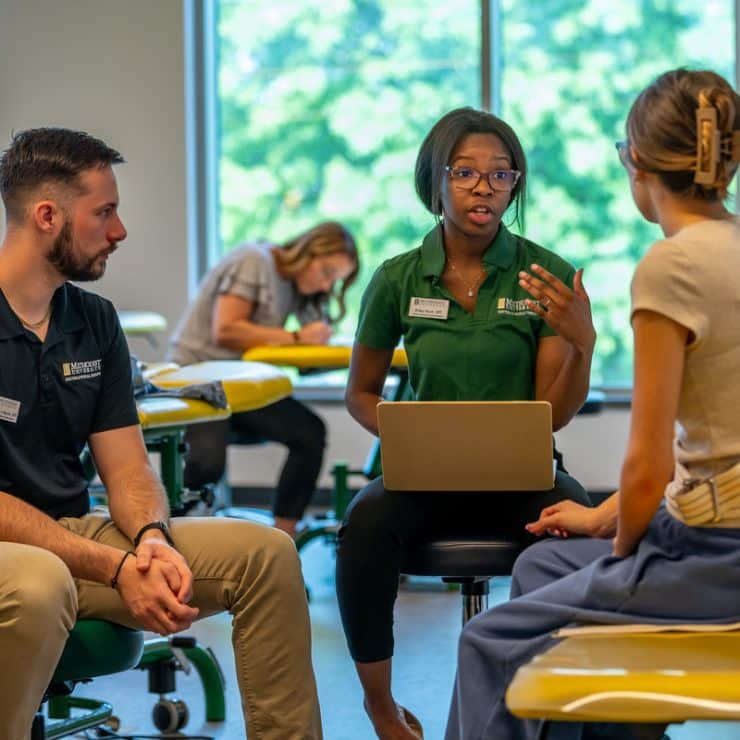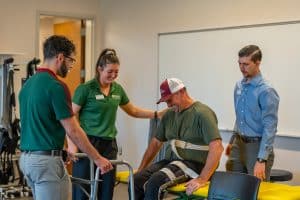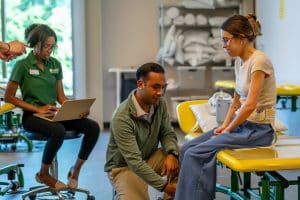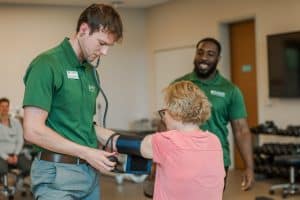
When Caroline Crockett was considering a doctorate in physical therapy, she had her pick of several different schools. But when she visited Methodist University, something was different.
When Caroline Crockett was considering a doctorate in physical therapy, she had her pick of several different schools. But when she visited Methodist University, something was different.
“It felt very family oriented, and I immediately felt welcomed,” said Crockett, a Clayton native who is set to graduate from Methodist University’s Doctor of Physical Therapy program in 2026. “I asked the admissions director if I could shadow classes one day to see what the program was like. After experiencing a day here, I realized this is where I wanted to be.”
 Crockett’s personal experience is one of many that lead to a similar theme for the Methodist University’s Doctor of Physical Therapy – a program that finds a balance between ensuring a close-knit feel between students and faculty while preparing students for highly-successful careers and lives afterwards.
Crockett’s personal experience is one of many that lead to a similar theme for the Methodist University’s Doctor of Physical Therapy – a program that finds a balance between ensuring a close-knit feel between students and faculty while preparing students for highly-successful careers and lives afterwards.
The program was established as MU’s first doctoral degree program in 2015 and is accredited by both the Southern Association of Colleges and Schools Commission on Colleges (SACSCOC) and the Commission on Accreditation in Physical Therapy Education (CAPTE).
The 33-month program, which includes classroom, laboratory, and clinical experiences, prepares students to become licensed physical therapists who are able to utilize movement sciences to help people with maintaining health and wellness, injuries, disabilities, or other health conditions that need treatment.
“It requires students to be autonomous physical therapy practitioners who can practice in any setting and with any level of patient out in the community,” said Dr. Stacia Thompson, program director and chair of MU’s Doctor of Physical Therapy program. “Our students are equipped to be generalists in physical therapy while also having the capability to specialize in any area of interest, such as orthopedics or neurological rehabilitation.”
Drew McAbee ’20D serves as an example of the program’s success in various settings – currently working as a physical therapist and clinic director at ProMotion Rehab and Sports Medicine in his hometown of Spartanburg, South Carolina. He credits his time at Methodist University for a seamless transition from the doctoral program to a successful career.
“You notice the difference with Methodist University graduates in the field,” McAbee said. “I’ve been proud to work with fellow alumni and students because of their focus, drive, communication skills, and hunger to learn and grow. It’s really unique how Methodist University fosters and creates a fire for ongoing learning and clinical development.”
 There are many reasons why the Doctor of Physical Therapy program sticks out from others in the region, starting with two key metrics: a 100% National Physical Therapy Examination pass rate and a 100% employment rate.
There are many reasons why the Doctor of Physical Therapy program sticks out from others in the region, starting with two key metrics: a 100% National Physical Therapy Examination pass rate and a 100% employment rate.
The program also boasts state-of-the-art facilities. It is housed in the McLean Health Sciences Building, a 38,800-square-foot facility that features open-space classrooms, motor control and pediatrics laboratory, daily living laboratory, mobility courtyard, clinical skills laboratory, a motion analysis laboratory, and human performance laboratory. Students even have unique access to a cadaver laboratory near the Stout Complex on the MU campus.
The collective Doctor of Physical Therapy faculty are also outstanding educators dedicated to student success. Both full-time and adjunct faculty are experts in a wide range of areas including neurology, orthopedics, pediatrics, wound care, women’s health, oncology, geriatrics, manual therapy, neurodevelopmental treatment, athletic training, and pharmacology.
“Every day is full of learning,” said Crockett, who plans to enter travel physical therapy of neurological rehabilitation following graduation. “I am constantly surrounded by excellence and challenged everyday both personally and professionally. I appreciate how each of our classes build upon each other. The professors at Methodist University set up our classes to be the most applicable to our careers as physical therapists.”
According to Thompson, although the program can be challenging, faculty and staff find ways to ease the burden on students.
“We provide interactions with students through our small class sizes along with individual faculty advising and class advising,” Thompson added. “But our family-focused feel affords students the ability to relax if they’re feeling stressed. We’ll host classes outside or have fun with ‘pie the professor’ days and class activities. Our faculty pay attention to how our students are feeling and quickly adapt in order to meet their learning needs.”
 The program even offers students various clinical rotation experiences across the nation and world – ensuring each student the chance to specialize in an area they are particularly interested in. They also become experts by participating in faculty-mentored research projects.
The program even offers students various clinical rotation experiences across the nation and world – ensuring each student the chance to specialize in an area they are particularly interested in. They also become experts by participating in faculty-mentored research projects.
“Methodist University’s Doctor of Physical Therapy program truly embodies the University’s mission of engage, enrich, and empower,” Crockett said. “I am thankful for a university that has strong values and challenges us to be the best versions of ourselves both in and out of the classroom.”
For Methodist University, the Doctor of Physical Therapy program is more than a nearly three-year learning journey for students – it is a springboard to the rest of their lives.
“From the clinical side to the relationship, family, friend, and community-oriented side, Methodist University’s Doctor of Physical Therapy program opened my eyes to so many opportunities,” said McAbee. “It taught me to be a better friend, clinician, and leader in our community. I’m forever thankful for the relationships, lessons, and experiences from Methodist University.”
The Class of 2028 Doctor of Physical Therapy admissions cycle (for a fall 2025 start) opened June 15. To learn more about the program and its admissions requirements, visit the program webpage.